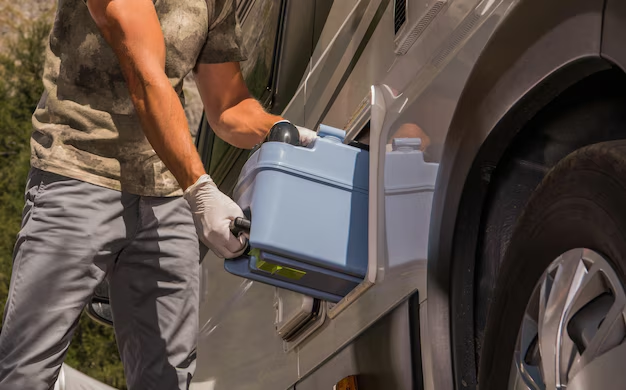Getting Your Camper Refrigerator Back on Track: A Practical Guide
For many adventurers and travel enthusiasts, a camper refrigerator is a crucial element of their mobile lifestyle. When your mini-fridge suddenly stops working, it can feel like a big headache, especially when you're on the road. Fear not! Fixing a camper refrigerator can be simpler than it seems. This guide breaks down the process into manageable steps, ensuring you can keep your food fresh and your adventures uninterrupted.
🚐 Understanding How Your Camper Refrigerator Works
To address any issue with your camper refrigerator, it's vital to grasp its basic functioning. Unlike traditional household fridges that rely solely on electricity, camper refrigerators commonly use a combination of electricity and gas to stay operational. Here are the common types you might encounter:
- Propane/Absorption Refrigerators: These run on propane gas, using heat to drive a cooling cycle. They are popular for their efficiency off-the-grid.
- Compressor/Electric Refrigerators: Running purely on electricity, these are similar to the ones you find at home.
- Thermoelectric Refrigerators: They use electric currents and are best suited for cooling smaller spaces and short trips.
Understanding which type you have is the first step toward diagnosing issues effectively.
⚒️ Common Problems and Solutions
When your camper refrigerator acts up, it often boils down to a few common problems. Here's how to diagnose and fix them:
1. Refrigerator Not Cooling Enough
A warm fridge could be caused by various issues. Here's what to check:
Power Source Issues: Ensure your fridge is correctly switched between gas and electric power if it's a dual-source model. Check the power plug and fuses.
Ventilation and Airflow: The back of the refrigerator should have proper ventilation. Blocked vents can obstruct cooling efficiency. Clear any obstructions and ensure there's enough space for airflow.
Thermostat Settings: Double-check your thermostat settings. Sometimes, the problem might be as simple as an incorrect setting.
2. Refrigerator Not Switching Modes (Gas/Electric)
If your fridge isn't switching between modes, here's what to examine:
Gas Supply and Ignition Issues: Ensure your propane tank has enough gas and valve connections are secure. For ignition problems, clean the burner and check electrical connections.
Circuit or Fuse Problems: Inspect for blown fuses or tripped circuit breakers if it's failing to run on electricity.
3. Malfunctioning Refrigerator Light or Indicator
Often, a fridge appears nonfunctional because of simple issues like a malfunctioning indicator or light.
Bulb Replacement: Check if the light bulb has burnt out and replace it if necessary.
Electrical Connections: Ensure all wiring is connected properly if the indicators aren't showing correctly.
🛠️ Troubleshooting Tips for Specific Refrigerators
Propane/Absorption Models
Flame Troubleshooting: The pilot light or burner might go out, especially in windy conditions. Regular cleaning of the burner and pilot assembly can prevent this. Use a soft brush to remove dirt and debris from these components.
Leveling the Fridge: Absorption refrigerators must be level to function properly. Use a leveler tool to check and adjust the fridge accordingly.
Compressor/Electric Models
Condenser Coil Maintenance: Dirty coils can affect performance. Clean them with a vacuum or brush to improve efficiency.
Seals and Insulation: The door seals should be tight. Check for gaps or damage that could let cold air escape, using the "paper test" (close a piece of paper in the door and see if it's gripped firmly).
Thermoelectric Models
- Environmental Influence: Thermoelectric coolers work best in ambient temperatures and might struggle in extremely hot weather. Consider additional external shades or insulation.
🌱 Energy Efficiency Tips for Your Camper Refrigerator
Improving energy efficiency not only reduces power consumption but also enhances the lifespan of your fridge:
- Pre-Chill Items: Cold items require less energy to maintain temperature.
- Fill the Space Smartly: A full fridge retains cold better than an empty one. Use water bottles to take up unused space.
- Keep Door Openings Brief: Each time you open the door, you let cold air escape, making the fridge work harder to re-cool.
- Use Reflective Heat Shields: Installing these behind your fridge can reflect heat away, improving efficiency especially in sun-exposed areas.
🔧 Routine Maintenance for Longevity
To keep your camper refrigerator in optimal condition, integrated routine maintenance is crucial. Implement these practices regularly:
- Check Seals and Gaskets: Look for wear and replace if necessary.
- Clean Compartments: Regular cleaning prevents odors and molds.
- Inspect Ventilation Areas: Ensure vents are free of obstruction.
- Run It Regularly: Even when not in use, running the fridge occasionally can keep it functioning well.
📋 Quick Fix Summary: Stay Prepared on the Road
Here's a succinct checklist to tackle unexpected fridge issues 📝:
- Verify Power Source: Ensure it's correctly set for electric or gas.
- Check for Obstructions: Ensure vents and fans are clear.
- Inspect Gaskets: Check for sealing issues that might let cold air escape.
- Evaluate Thermostat: Ensure it's properly set to cooling mode.
- Assess Gas Supply & Connections: If propane is being used, verify supply.
By maintaining a proactive approach and understanding your specific refrigerator type, you can address most problems smoothly, saving both time and frustration.
When you're out on the road, a functioning camper refrigerator is essential for a hassle-free and enjoyable journey. By mastering the basics of your fridge's operation and maintaining it with care, you'll ensure cold drinks and fresh ingredients are always within reach, right in the heart of nature. Happy travels and ongoing adventures! 🚐🍦

